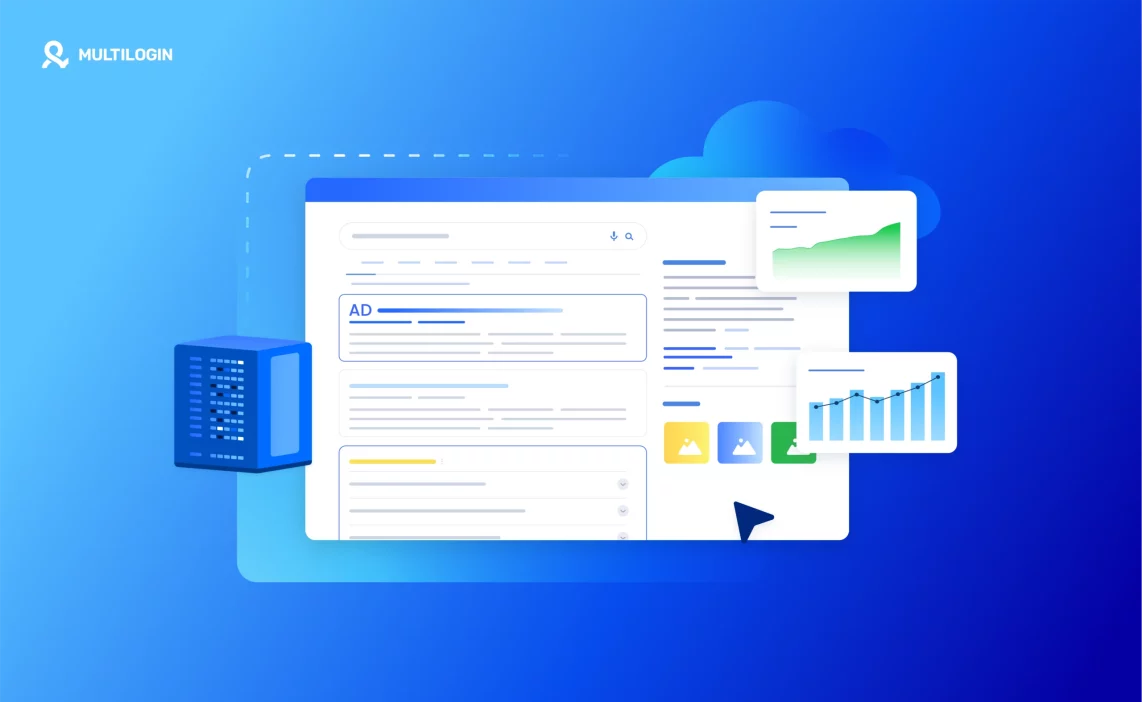Tired of getting blocked while tracking SERP positions or scraping SEO data?
If you’re running rank tracking, competitor analysis, or local SERP monitoring at scale, you already know the pain: CAPTCHAs, IP blocks, inconsistent data, and worse—getting banned before your script even runs.
That’s why smart SEO teams use SEO proxies—but not just any proxies.
In this guide, we’re breaking down the 7 best SEO proxies in 2026 and showing you how to supercharge them using a stealth-friendly proxy browser like Multilogin.
Why You Need SEO Proxies in 2026
Search engines are clamping down on automation. They detect patterns like:
- Repeated keyword queries
- High search volume from single IPs
- Suspicious browser behaviors
Without proxies, your keyword tracking tools or scraping scripts will get flagged. Even worse, your data will be inaccurate if Google serves you results based on a different location or device.
Proxies help SEO teams:
- Pull local SERPs from multiple cities/countries
- Monitor competitor rankings without distortion
- Run scripts at scale without bans
- Test site visibility across devices
But proxies alone aren’t enough. Multilogin + proxies = invisibility and control. More on that soon.
1. Nodemaven
Nodemaven is a rising star in the SEO proxy space. It offers both residential and datacenter proxies, optimized for scraping and search-related tasks.
What makes it perfect for SERP analysis?
- Rotating IPs for unlimited keyword checks
- Location targeting for hyper-local SERP insights
- No CAPTCHA errors when paired with stealth browsers
And yes—it integrates smoothly with Multilogin, making it one of the best setups for undetectable rank tracking.
Why it stands out:
- Fast, stable, and affordable for SEO use
- Reliable for Google, Bing, and other search engines
- Supports multiple threads and sessions
Use case: Plug Nodemaven into Multilogin, assign a profile per target location, and track rank positions like a local user from anywhere.
2. Oxylabs
Oxylabs offers premium residential and datacenter proxies built for web scraping. Their SEO proxy APIs are geared specifically toward SERP data extraction.
Key features:
- Country and city-level targeting
- Google SERP scraping endpoints
- High success rates on keyword queries
Limitations: Expensive for solo users or small SEO agencies.
3. Smartproxy
Smartproxy delivers rotating residential proxies with solid infrastructure for SEO tasks. It’s easy to use, and their SERP Scraping API simplifies keyword tracking without dealing with proxy logic.
Good for:
- SEO tool developers
- Agencies tracking thousands of keywords
- Google and Bing compatibility
Bonus: Their dashboard is user-friendly and great for beginners.
4. Soax
Soax provides clean and real residential IPs, making them harder to detect when scraping search results.
Highlights:
- Flexible geo-targeting
- Mobile and residential proxy mix
- API for keyword data collection
Use this when you want mobile SERP accuracy, like checking mobile-first indexing effects or app visibility.
5. NetNut
NetNut is a premium proxy provider with ISP-level residential IPs, meaning no peer-to-peer rotation. It offers reliable uptime and great speed, which is crucial when you’re scraping thousands of keywords across regions.
Why SEOs like it:
- Static IP options
- Fast throughput
- No CAPTCHAs with correct headers
Pair it with Multilogin to mask browser fingerprints for enterprise-scale SEO monitoring.
6. PacketStream
If you’re running SEO on a budget, PacketStream offers affordable residential proxies with decent performance for rank tracking.
Pros:
- Pay-as-you-go pricing
- Legit residential IP pool
- Easy integration with scraping tools
Cons:
- Slower and less stable under heavy loads
- No advanced targeting
Still, for small-scale SEO monitoring or keyword research, it’s a solid starting point.
7. Bright Data (formerly Luminati)
Bright Data has long been one of the biggest names in proxy services. Their network is vast and offers granular targeting for SERP checks. They also offer a dedicated Search Engine Crawler API.
That said:
- Very expensive
- Overkill for most SEO teams
- Limited stealth without browser masking
It works—but if you’re using it with a raw script or headless browser, detection is still an issue. That’s where anti-detect browsers like Multilogin make all the difference.
Why Multilogin Is the Secret Weapon for SERP Analysis
Let’s be real: proxies get you in the door—but Multilogin makes you invisible.
Search engines don’t just look at your IP anymore. They track browser fingerprints, fonts, canvas rendering, WebGL, timezone, language settings—and more.
Multilogin solves that by:
- Generating fully isolated browser profiles per proxy
- Mimicking real-user sessions that look like legit searchers
- Letting you scale rank tracking across regions and devices
Whether you’re scraping Google Maps, checking featured snippet placement, or testing desktop vs. mobile SERPs, Multilogin ensures you’re seeing what real users see.
And yes—you can automate it all using Multilogin’s browser automation API.
Want accurate SERP analysis across regions? Test Multilogin Today – 5 profiles, 200MB proxy traffic, €1.99!
Frequently Asked Questions About SEO Proxies & SERP Tools
An SEO proxy is a server that routes your connection to appear as if it’s coming from another location, helping you safely and accurately gather search engine data like rankings and keyword positions.
Search engines deliver results based on location and user history. Proxies help simulate different users across regions, devices, and IPs—making your SEO data more accurate.
Yes. Multilogin is built to work with residential, datacenter, and ISP proxies—including Nodemaven, Smartproxy, and others.
VPNs change your IP, but don’t protect against browser fingerprinting. For SERP monitoring, this can still lead to inaccurate results or detection.
Final Thoughts
Choosing the right SEO proxy can make or break your strategy—especially if you’re tracking rankings across multiple locations, devices, and search engines. Whether you’re running a full-stack SEO agency or just optimizing your brand’s online presence, the proxies you use must be fast, secure, and built to handle the nuances of SERP analysis.
But here’s the thing: using proxies alone isn’t always enough. You need stealth. You need control. And you definitely need an environment where your sessions don’t get flagged, blocked, or distorted by data noise.
That’s where antidetect browsers like Multilogin come in.
With Multilogin’s built-in residential proxy support, you don’t just get access to global SERP data—you also manage each SEO project in its own isolated browser profile, with unique fingerprints that mimic real users. No leaks. No overlaps. Just clean, accurate, geo-specific results—exactly how Google shows it to the local user.


